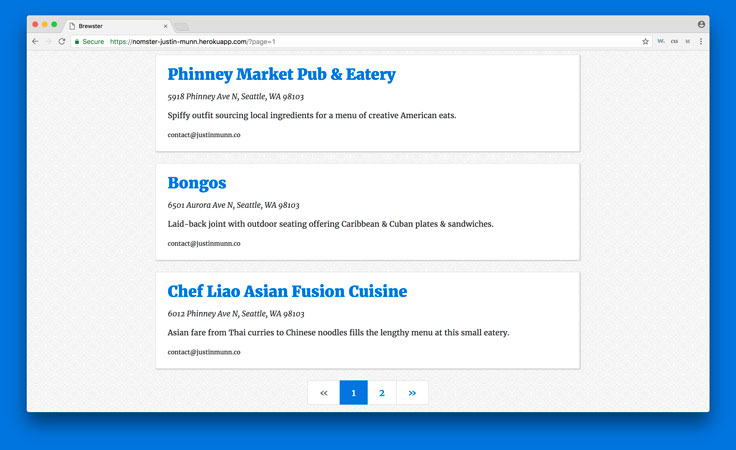Pushing Through Errors
Firehose Project: Week 2
- I began work on a yelp clone called Nomster.
- I had my first mentor Skype session with Ash. We pair programmed through a ruby challenge. I can already tell he will be a great learning catalyst in my coding journey.
- Upgraded my previous Muir Words to Rails 5 & Bootstrap 4
Upgrading to Rails 5 & Bootstrap 4
After finishing the Muir Words app I tried to update the gemfile to Rails 5. I try to go through a checklist to combat the errors. Check for typos, check for syntax error, check install documentation, restart the server. But I received constant error messages so I ended up rebasing to the last working version of the app. I knew the next app would be a fresh install with Rails 5 so I moved on, hoping to gain knowledge and revisit.
Then it hit me, keep it chunky. I’ve been coding HTML emails for the last 4 years and the table based code and deep nesting can get pretty messy. One thing it taught me was to break chunks of code until I find the problem. Replace it with working chunks of code and finesse my way to a solution. Now I had a working gemfile for a Rails 5/Bootstrap 4 app. I compared the differences to the gem file in my Rails 4 app using a diff tool. It wasn’t the install files that created the errors as I suspected. It was dependent gems that needed updating too.
Chunk by chunk I updated the dependent gems until I was error free. The site was back up and running on my local server but the layout was off. A quick inspect element and Bootstrap 4 documentation reference later, I realized I had to rewrite most of the grid classes. Bootstrap rewrote their grid class syntax so my legacy classes failed. Luckily this is a simple site with only a few pages. I could see how updating class names across a more complex site would turn into it’s own project. I guess that’s the downside of frameworks. They let you create sites quickly, but if the syntax changes your success or failure it tied to re-learning the new documentation.
Customizing will_paginate gem
Another challenge for the week was to implement pagination functionality into the new yelp clone app Nomster. I’m calling mine Brewster. After getting the will_paginate gem implemented I wanted to change the output to integrate better with Bootstrap. I was chatting with another student and realized that there were other gems that tied into will_paginate to do just that. Since “Good Artists copy; Great Artists steal”, I decided to use the open-sourced work of others as a jumping board. This openness is what I love about the web.
“If you see a great master, you will always find that he used what was good in his predecessors, and that it was this which made him great.” —T.S. Eliot
There was an existing gem that integrated with Bootstrap 4’s syntax online created by Ivan Palamarchuk. This was a great start but I wanted to take advantage of a few other Bootstrap classes not implemented. I saw in the will_paginate HTML renderer docs that the magic happened in the initializers/will_paginate.rb. Reverting back to my chunky iteration, I created a copy in my app that matched the will_paginate-bootstrap4 initializer. I commented out everything I didn’t want to change. Drop in the desired extra Bootstrap classes to the element and voilà: Beautiful customized Bootstrap pagination.

Contemplating Complexity
My final thought of the second week is a higher level one brought up by my mentor. He introduced the idea of Complexity in computer science. He encouraged thinking about it as I come up with solutions. Decreasing complexity can improve the performance of my functions and apps. I’ll be reading more on the subject and applying it to come up with a better solution to this reverse array challenge. One goal this week is to manipulate the original array instead of increasing complexity by creating a new array like my current solution:
# Looking for ways to reduce complexity in this solution
array = [1,2,3,4,5]
def reverse_array(array)
new_array = []
array.length.times do |n|
i = array.length -1 -n
new_array << array[i]
end
return new_array
endAs I begin to dive into algorithms and more complex apps this will be a constant point of thought and opportunity for improvement. Until next week.
